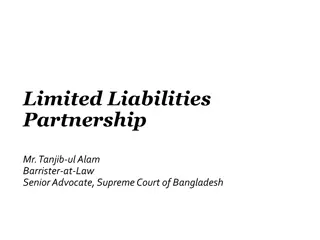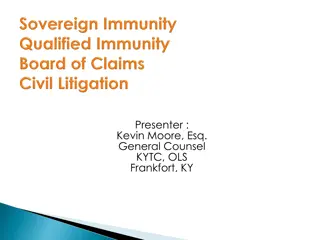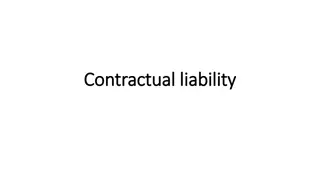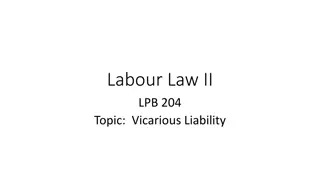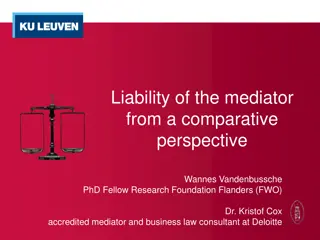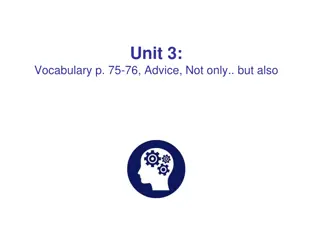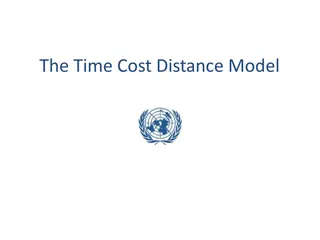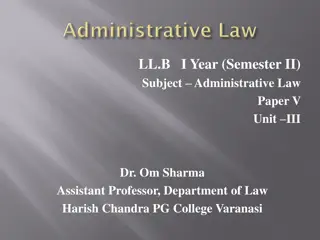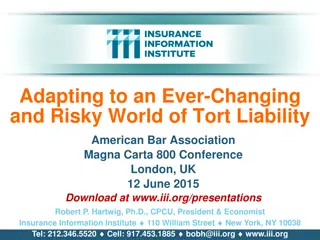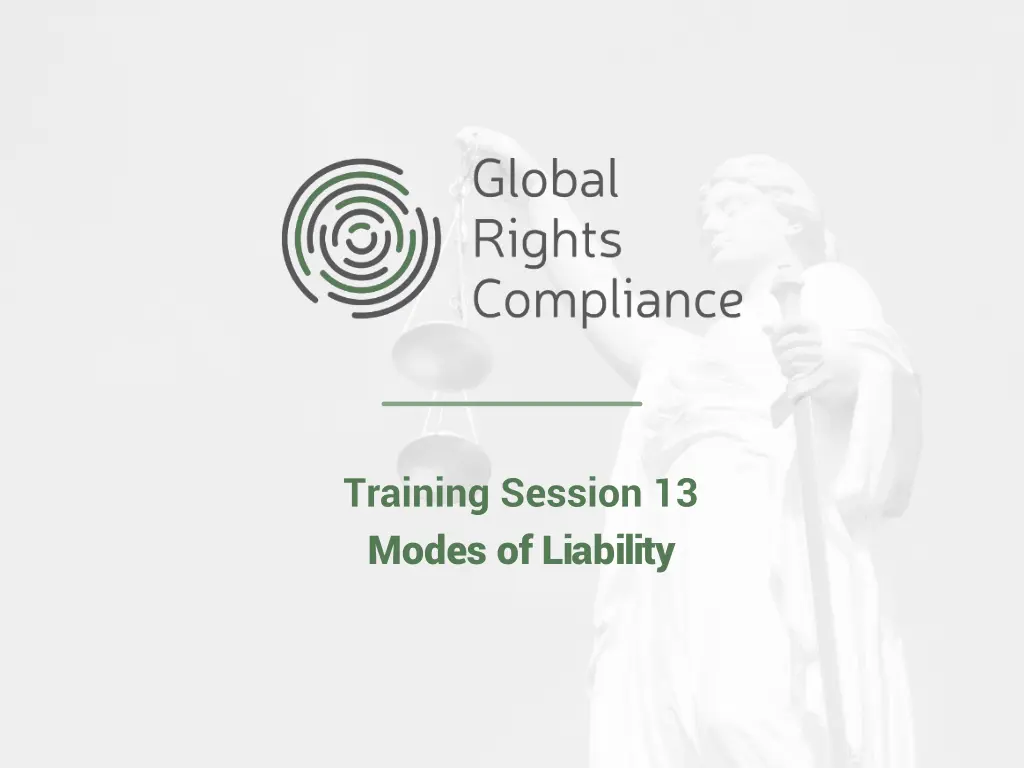
Understanding Modes of Liability in International Crimes
Explore the various modes of liability that hold perpetrators accountable for their involvement in international crimes. Learn about the comparisons between modes under the CCU, ICC Statute, and Statutes of the ICTY/ICTR, including direct commission, direct perpetration, organizing, ordering, instigation, aiding and abetting, and more.
Download Presentation

Please find below an Image/Link to download the presentation.
The content on the website is provided AS IS for your information and personal use only. It may not be sold, licensed, or shared on other websites without obtaining consent from the author. If you encounter any issues during the download, it is possible that the publisher has removed the file from their server.
You are allowed to download the files provided on this website for personal or commercial use, subject to the condition that they are used lawfully. All files are the property of their respective owners.
The content on the website is provided AS IS for your information and personal use only. It may not be sold, licensed, or shared on other websites without obtaining consent from the author.
E N D
Presentation Transcript
Training Session 13 Modes of Liability
Modes of liability describe the ways in which perpetrators can be held responsible for their participation in international crimes.
Comparing modes under the CCU, ICC Statute and Statutes of the ICTY/ICTR CCU ICC ICTY/ICTR Direct commission (ICTY, Article 7(1)/ ICTR, Article 6(1)) CCU ICC ICTY/ICTR Direct perpetration (Article 18) Direct commission (Article 25(3)(a)) Organising (Article 27(3)) No direct comparison, but might be covered by: Indirect perpetration (Article 25(3)(a)) Indirect co-perpetration (Article 25(3)(a)) Ordering (Article 25(3)(b)) No direct comparison, but might be covered by: Planning (ICTY,Article 7(1); ICTR,Article 6(1)) Ordering (ICTY,Article 7(1); ICTR,Article 6(1)) Instigation (ICTY,Article 7(1); ICTR,Article 6(1)) Aiding and abetting (ICTY,Article 7(1); ICTR,Article 6(1)) Perpetration through others not criminally liable (Article 27(2)) Indirect perpetration (Article 25(3)(a)) N/A would be charged under direct commission Abetting (Article 27(4)) Soliciting or inducing (Article 25(3)(b)) In some circumstances: Aiding and abetting (Article 25(3)(c)) Liability for groups of persons, organised groups, and criminal organisations (Articles 28, 27(3) and 30) No direct comparison Might be covered by: Co-perpetration (Article 25(3)(a)) Indirect perpetration (Article 25(3)(a)) Indirect co-perpetration (Article 25(3)(a)) Other contributions to crimes as a part of a group of persons acting with a common purpose (Article 25(3)(d)) No direct comparison Might be covered by: Joint criminal enterprise (JCE) (ICTY, Article 7(1)/ ICTR, Article 6(1)) Acting as an accessory (Article 27(5)) Aiding and abetting (Article 25(3)(c)) Other contributions to crimes as a part of a group of persons acting with a common purpose (Article 25(3)(d)) Aiding and abetting (ICTY,Article 7(1); ICTR,Article 6(1))
ICL: Planning ICTY, or evi Appeal Judgment 925. Furthermore, the Trial Chamber found that he was aware of the massive displacement of Kosovo Albanian civilians on the basis that he witnessed thousands of displaced persons in 1998 and that he received regular MUP reports throughout March to June 1999 that reported on the increasing numbers of Kosovo Albanians crossing the borders from Kosovo into Albania or FYROM. He also knew about the humanitarian situation as well as killings and other violent crimes against Kosovo Albanians through other sources, including the media. 926. Under these circumstances, the Appeals Chamber finds that it was foreseeable to or evi that crimes of a sexual nature might be committed. The Appeals Chamber recalls that thousands of Kosovo Albanian civilians were being forcibly displaced and mistreated on a massive scale by Serbian forces who could act with near impunity, and that women were frequently separated from the men and thereby rendered especially vulnerable. The Appeals Chamber, Judge Tuzmukhamedov dissenting, finds that in such environment, the possibility that sexual assaults might be committed was sufficiently substantial as to be foreseeable to or evi and that he willingly took the risk when he participated in the JCE. The Appeals Chamber, Judge Tuzmukhamedov dissenting, is further satisfied that, in light of his knowledge of the persecutory nature of the campaign, it was also foreseeable to or evi that such sexual assaults might be carried out with discriminatory intent.
CCU: Organising Article 27. Types of accomplices 3. An organiser shall mean person who has organised a criminal offence (or criminal offences) or supervised its (their) preparation or commission. An organiser shall also mean a person who has created an organised group or criminal organisation, supervised it, funded it, or organised the covering up of the criminal activity of an organised group or criminal organisation.
ICL: Aiding, abetting or otherwise assisting ICTY, Furund ijaTrial Judgment 272. The Trial Chamber is satisfied that all the elements of rape were met. Again, the rapes and sexual assaults were committed publicly; members of the Jokers were watching and milling around the open door of the pantry. They laughed at what was going on. The Trial Chamber finds that Witness A suffered severe physical and mental pain, along with public humiliation, at the hands of Accused B in what amounted to outrages upon her personal dignity and sexual integrity. 273. The position of the accused has already been discussed. He did not personally rape Witness A, nor can he be considered, under the circumstances of this case, to be a co- perpetrator. The accused's presence and continued interrogation of Witness A encouraged Accused B and substantially contributed to the criminal acts committed by him. 274. On the evidence on record, the Trial Chamber is satisfied that the Prosecution has proved its case against the accused beyond reasonable doubt. In accordance with Article 7(1) and the findings of the Trial Chamber that the actus reus of aiding and abetting consists of assistance, encouragement, or moral support which has a substantial effect on the perpetration of the crime and that the mens rea required is the knowledge that these acts assist the commission of the offence, the Trial Chamber holds that the presence of the accused and his continued interrogation aided and abetted the crimes committed by Accused B. He is individually responsible for outrages upon personal dignity including rape, a violation of the laws or customs of war under Article 3 of the Statute. 275. The Trial Chamber therefore finds the accused, for aiding and abetting, guilty of a Violation of the Laws or Customs of War (outrages upon personal dignity including rape) on Count 14.
CCU: Acting as an accessory Article 27. Types of accomplices 5. An accessory shall mean a person who has facilitated the commission of a criminal offence by other accomplices, by way of advice, instructions, or by supplying the means or tools, or removing obstacles, and also a person who promised in advance to cover up a criminal offence, tools or means, traces of crime or criminally obtained things, to buy or sell such things, or otherwise facilitate the covering up of a criminal offence.
2017 ICC arrest warrant against Mahmoud Mustafa Busayf Al-Werfalli Video footage posted on social media showed Mr Al-Werfalli making gestures to execute some individuals.
ICL: Ordering ICTR, Akayesu Trial Judgment 452. On the basis of the evidence set forth herein, the Chamber finds beyond a reasonable doubt that the Accused had reason to know and in fact knew that sexual violence was taking place on or near the premises of the bureau communal, and that women were being taken away from the bureau communal and sexually violated. There is no evidence that the Accused took any measures to prevent acts of sexual violence or to punish the perpetrators of sexual violence. In fact there is evidence that the Accused ordered, instigated and otherwise aided and abetted sexual violence. [ ] When Witness OO and two other girls were apprehended by Interahamwe in flight from the bureau communal, the Interahamwe went to the Accused and told him that they were taking the girls away to sleep with them. The Accused said take them. The Accused told the Interahamwe to undress Chantal and march her around. He was laughing and happy to be watching and afterwards told the Interahamwe to take her away and said you should first of all make sure that you sleep with this girl. The Chamber considers this statement as evidence that the Accused ordered and instigated sexual violence, although insufficient evidence was presented to establish beyond a reasonable doubt that Chantal was in fact raped. 692. The Tribunal finds, under Article 6(1) of its Statute, that the Accused, by his own words, specifically ordered, instigated, aided and abetted the following acts of sexual violence: (i) the multiple acts of rape of ten girls and women, including Witness JJ, by numerous Interahamwe in the cultural center of the bureau communal; (ii) the rape of Witness OO by an Interahamwe named Antoine in a field near the bureau communal; (iii) the forced undressing and public marching of Chantal naked at the bureau communal.
CCU: Ordering Article 438. Violation of rules of the warfare 1. Cruel treatment of prisoners of war or civilians, deportation of civilian population to engage them in forced labour, pillage of national treasures on occupied territories, use of methods of the warfare prohibited by international instruments, or any other violations of rules of the warfare stipulated by international treaties, ratified by the Verkhovna Rada of Ukraine, and also issuing an order to commit any such actions [ ].
Command Responsibility 1. The High Contracting Parties and the Parties to the conflict shall repress grave breaches, and take measures necessary to suppress all other breaches, of the Conventions or of this Protocol which result from a failure to act when under a duty to do so. Failure to Act Additional Protocol I, Article 86 2. Thefact that a breach of the Conventions or of this Protocol was committed by a subordinate does not absolve his superiors from penal or disciplinary responsibility, as the case may be, if they knew, or had information which should have enabled them to conclude in the circumstances at the time, that he was committing or was going to commit such a breach and if they did not take all feasible measures within their power to prevent or repress the breach. Duty of Commanders Additional Protocol I, Article 87 1. The High Contracting Parties and the Parties to the conflict shall require military commanders, with respect to members of the armed forces under their command and other persons under their control, to prevent and, where necessary, to suppress and to report to competent authorities breaches of the Conventions and of this Protocol. 2. In order to prevent and suppress breaches, High Contracting Parties and Parties to the conflict shall require that, commensurate with their level of responsibility, commanders ensure that members of the armed forces under their command are aware of their obligations under the Conventions and this Protocol. 3. The High Contracting Parties and Parties to the conflict shall require any commander who is aware that subordinates or other persons under his control are going to commit or have committed a breach of the Conventions or of this Protocol, to initiate such steps as are necessary to prevent such violations of the Conventions or this Protocol, and, where appropriate, to initiate disciplinary or penal action against violators thereof. Command Responsibility for Failure to Prevent, Repress or Report War Crimes Customary IHL, Rule 153 Commanders and other superiors are criminally responsible for war crimes committed by their subordinates if they knew, or had reason to know, that the subordinates were about to commit or were committing such crimes and did not take all necessary and reasonable measures in their power to prevent their commission, or if such crimes had been committed, to punish the persons responsible.
Command Responsibility ICTY, Delali Trial Judgment 769. There is a plethora of evidence of the knowledge on the part of Zdravko Muci that the guards under his command were committing crimes [ ]. Besides his imputed knowledge, as a result of his deliberate absences from duty, which were frequent and regular, he was aware that his subordinates would commit offences during such absences. Mr. Muci admitted in his interview with the Prosecution that he was aware that crimes were being committed in the prison-camp at elebi i in June and July 1992 and that he had personally witnessed detainees being abused during this period. He was also informed of the rapes in the camp in July 1992. He did, however, state that after that period detainees were not mistreated when he was present. [ ] 770. The crimes committed in the elebi i prison-camp were so frequent and notorious that there is no way that Mr. Muci could not have known or heard about them. Despite this, he did not institute any monitoring and reporting system whereby violations committed in the prison-camp would be reported to him, notwithstanding his knowledge that Hazim Deli , his deputy, had a penchant and proclivity for mistreating detainees. There is no doubt that Mr. Muci was fully aware of the fact that the guards at the elebi i prison-camp were engaged in violations of international humanitarian law.

